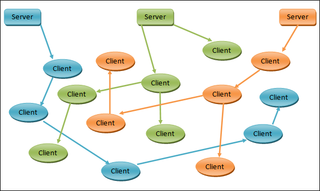
Peer-to-peer (P2P) computing or networking is a distributed application architecture that partitions tasks or workloads between peers. Peers are equally privileged, equipotent participants in the network, forming a peer-to-peer network of nodes.
Uploading refers to transmitting data from one computer system to another through means of a network. Common methods of uploading include: uploading via web browsers, FTP clients], and terminals (SCP/SFTP). Uploading can be used in the context of clients that send files to a central server. While uploading can also be defined in the context of sending files between distributed clients, such as with a peer-to-peer (P2P) file-sharing protocol like BitTorrent, the term file sharing is more often used in this case. Moving files within a computer system, as opposed to over a network, is called file copying.
BitTorrent, also referred to as simply torrent, is a communication protocol for peer-to-peer file sharing (P2P), which enables users to distribute data and electronic files over the Internet in a decentralized manner. The protocol is developed and maintained by Rainberry, Inc., and was first released in 2001.
WASTE is a peer-to-peer and friend-to-friend protocol and software application developed by Justin Frankel at Nullsoft in 2003 that features instant messaging, chat rooms, and file browsing/sharing capabilities. The name WASTE is a reference to Thomas Pynchon's novel The Crying of Lot 49. In the novel, W.A.S.T.E. is an underground postal service.
An anonymous P2P communication system is a peer-to-peer distributed application in which the nodes, which are used to share resources, or participants are anonymous or pseudonymous. Anonymity of participants is usually achieved by special routing overlay networks that hide the physical location of each node from other participants.
The Invisible Internet Project (I2P) is an anonymous network layer that allows for censorship-resistant, peer-to-peer communication. Anonymous connections are achieved by encrypting the user's traffic, and sending it through a volunteer-run network of roughly 55,000 computers distributed around the world. Given the high number of possible paths the traffic can transit, a third party watching a full connection is unlikely. The software that implements this layer is called an "I2P router", and a computer running I2P is called an "I2P node". I2P is free and open sourced, and is published under multiple licenses.
This is a timeline of events in the history of networked file sharing.

P2PTV refers to peer-to-peer (P2P) software applications designed to redistribute video streams in real time on a P2P network; the distributed video streams are typically TV channels from all over the world but may also come from other sources. The draw to these applications is significant because they have the potential to make any TV channel globally available by any individual feeding the stream into the network where each peer joining to watch the video is a relay to other peer viewers, allowing a scalable distribution among a large audience with no incremental cost for the source.
File sharing is a method of distributing electronically stored information such as computer programs and digital media. Below is a list of file sharing applications, most of them make use of peer-to-peer file sharing technologies.

Tribler is an open source decentralized BitTorrent client which allows anonymous peer-to-peer by default. Tribler is based on the BitTorrent protocol and uses an overlay network for content searching. Due to this overlay network, Tribler does not require an external website or indexing service to discover content. The user interface of Tribler is very basic and focused on ease of use instead of diversity of features. Tribler is available for Linux, Windows, and OS X.
The following is a general comparison of BitTorrent clients, which are computer programs designed for peer-to-peer file sharing using the BitTorrent protocol.

Phex is a peer-to-peer file sharing client for the gnutella network, released under the terms of the GNU General Public License, so Phex is free software. Phex is based on Java SE 5.0 or later.
An embedded database system is a database management system (DBMS) which is tightly integrated with an application software; it is embedded in the application. It is a broad technology category that includes:

Retroshare is a free and open-source peer-to-peer communication and file sharing app based on a friend-to-friend network built by GNU Privacy Guard (GPG). Optionally peers may exchange certificates and IP addresses to their friends and vice versa.

BTDigg is the first Mainline DHT search engine. It participated in the BitTorrent DHT network, supporting the network and making correspondence between magnet links and a few torrent attributes which are indexed and inserted into a database. For end users, BTDigg provides a full-text database search via a Web interface. The Web part of its search system retrieved proper information by a user's text query. The Web search supported queries in European and Asian languages. The project name was an acronym of BitTorrent Digger. It went offline in June 2016, reportedly due to index spam. The site returned later in 2016 at a dot-com domain, went offline again, and is now online. The btdig.com site has its torrent crawler's source code listed on GitHub, dhtcrawler2.

Twister is a decentralized, experimental peer-to-peer microblogging program which uses end-to-end encryption to safeguard communications. Based on BitTorrent- and Bitcoin-like protocols, it has been likened to a distributed version of Twitter.

The InterPlanetary File System (IPFS) is a protocol, hypermedia and file sharing peer-to-peer network for storing and sharing data in a distributed file system. IPFS uses content-addressing to uniquely identify each file in a global namespace connecting IPFS hosts.

PeerTube is a free and open-source, decentralized, ActivityPub federated video platform powered by WebTorrent, that uses peer-to-peer technology to reduce load on individual servers when viewing videos.

WebTorrent is a peer-to-peer (P2P) streaming torrent client written in JavaScript, from the same author, Feross Aboukhadijeh, of YouTube Instant, and the team at WebTorrent and on GitHub, for use in web browsers, as well as a WebTorrent Desktop stand alone version able to bridge WebTorrent and BitTorrent serverless networks.

MangaDex is a nonprofit website that aggregates translations of manga, manhwa, and manhua. Content on the website is usually unofficial, uploaded by "scanlation" groups, but links to official services like Manga Plus and Bilibili Comics are also provided on the website. MangaDex was started in 2018 by developer Hologfx, and was initially funded through user donations, but is now funded through affiliate programs. The website is blocked in several countries, including Italy and Russia.












